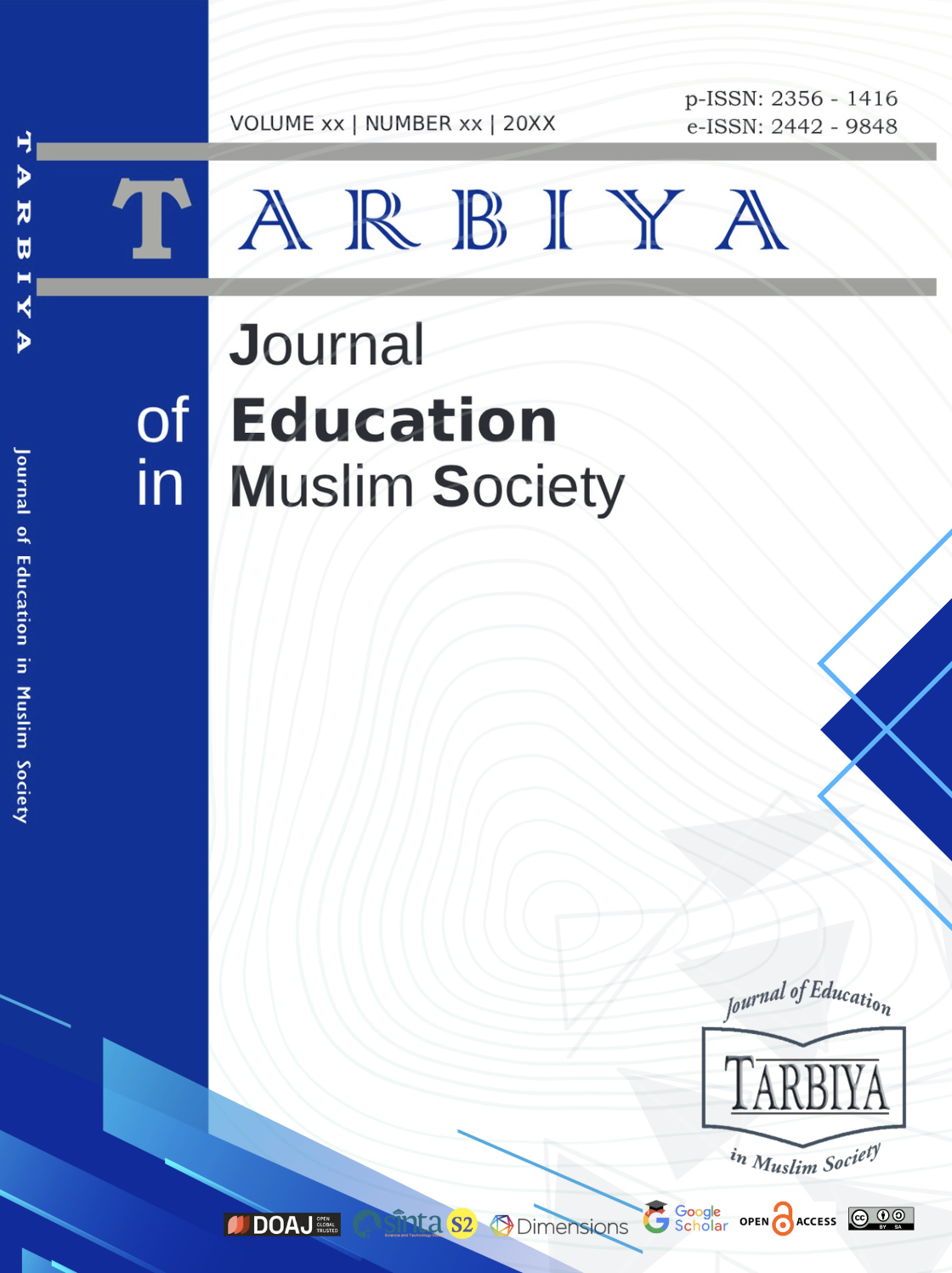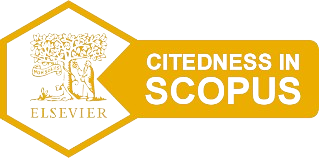The Concept of the Perfect Human (al-Insan al-Kamil) in Islamic Education According to al-Ghazali and Its Implementation in Indonesian Islamic Higher Education
DOI:
https://doi.org/10.15408/tjems.v12i1.46553Keywords:
al-insan al-kamil, al-Ghazali’s educational thought, Islamic virtues (al-fadhā’il), Islamic higher education, character formation, pemikiran pendidikan al-Ghazali, ; kebajikan Islam (al-fadhā’il), ); pendidikan tinggi Islam, pembentukan karakterAbstract
Abstract
Human perfection is intrinsically linked to virtues (al-fadhā’il), namely wisdom (al-hikmah), courage (al-syaja‘ah), temperance (al-‘iffah), and justice (al-‘adalah). Through these virtues, individuals attain true happiness, which al-Ghazali in Ma‘arij al-Quds describes as beholding God in the hereafter or attaining divine knowledge (ma‘rifat al-Bāri). This study has three main objectives: first, to explain the concept of the Perfect Human (al-insan al-kamil); second, to analyze al-Ghazali’s perspective on this concept within Islamic education; and third, to examine its implementation at STIT Insan Kamil, Bogor City. The research employs qualitative methods in a descriptive, analytical, implementative, and evaluative approach, drawing on interviews with students, lecturers, and staff, supported by institutional data. For al-Ghazali, the Perfect Human is one who balances morality, intellect, and righteous deeds, achieving harmony in relationships with God, fellow human beings, and the universe. Education should therefore go beyond worldly ambitions and guide individuals toward closeness to God. At STIT Insan Kamil, this concept is applied, although Qur’an memorization targets remain less optimal and require continuous improvement.
Abstrak
Kesempurnaan manusia erat kaitannya dengan kebajikan (al-fadhā’il), yaitu kebijaksanaan (al-hikmah), keberanian (al-syaja‘ah), kesederhanaan (al-‘iffah), dan keadilan (al-‘adalah). Melalui kebajikan tersebut manusia mencapai kebahagiaan sejati, yang oleh al-Ghazali dalam Ma‘arij al-Quds digambarkan sebagai memandang Allah di akhirat atau mengenal-Nya (ma‘rifat al-Bāri). Penelitian ini memiliki tiga tujuan utama, yaitu menjelaskan konsep insan kamil (al-Insan al-Kamil), menganalisis pandangan al-Ghazali tentang konsep ini dalam pendidikan Islam, serta mengkaji implementasinya di STIT Insan Kamil Kota Bogor. Penelitian ini menggunakan metode kualitatif dengan pendekatan deskriptif, analitis, implementatif, dan evaluatif melalui wawancara dengan mahasiswa, dosen, dan tenaga kependidikan, serta ditunjang oleh telaah data kelembagaan. Bagi al-Ghazali, insan kamil adalah manusia yang mampu menjaga keseimbangan antara akhlak, intelektualitas, dan amal saleh sehingga tercapai keharmonisan hubungan dengan Allah, dengan sesama manusia, dan dengan alam semesta. Pendidikan karena itu tidak hanya berorientasi pada status duniawi atau kekayaan, tetapi bertujuan mendekatkan individu kepada Allah. Di STIT Insan Kamil, konsep ini diterapkan meskipun target hafalan al-Qur’an masih belum optimal dan terus ditingkatkan.
How to Cite: Iskandar S., Saepudin, D., Husaini, A., & Syafrin, N. (2025). The Concept of the Perfect Human (al-Insan al-Kamil) in Islamic Education According to al-Ghazali and Its Implementation in Indonesian Islamic Higher Education. TARBIYA: Journal of Education in Muslim Society, 12(1), 97-114. doi:10.15408/tjems.v12i1.46553.
References
Ab Rashid, R., Fazal, S. A., Ab. Halim, Z., Mat Isa, N., Mohamad Yusoff, Z. J., Musa, R., & Hamzah, M. I. (2020). Conceptualizing the characteristics of moderate Muslims: A systematic review. Social Identities, 26(6), 829–841. https://doi.org/10.1080/13504630.2020.1814720
Abdullah, M. A. (2003). Islamic studies di perguruan tinggi: Pendekatan integratif-interkonektif. Yogyakarta: Pustaka Pelajar.
Ahmad, S., & Wan Abdullah, W. S. (2023). Falsafah Maqasid al-Quran Imam al-Ghazali dan Faham Ilmu. International Journal of Islamic Thought, 23(1). https://doi.org/10.24035/ijit.23.2023.262
Al-Ghazali, A. H. M. ibn M. (1968). Ma’arij al-Quds fi Madarij Ma’rifat al-Nafs. Kairo: Maktabat al-Jundi.
Al-Ghazali, A. H. M. ibn M. (1970). Al-Arba’in fi Ushul al-Din (M. M. Abu al-A’la, Ed.). Kairo: Maktabat al-Jundi.
Al-Ghazali, A. H. M. ibn M. (1970). Misykat al-Anwar (fi Qushur al-Awali) (M. M. Abu al-A’la, Ed.). Kairo: Maktabat al-Jundi.
Al-Ghazali, A. H. M. ibn M. (1980). Al-Imla’ fi Isykalat al-Ihya’. Beirut: Dar al-Fikr.
Al-Ghazali, A. H. M. ibn M. (1980). Ihya’ ‘Ulum al-Din. Beirut: Dar al-Fikr.
Al-Ghazali, A. H. M. ibn M. (n.d.). Ayyuhal Walad (Terj. A. F. bin Zamzam). Kedah: Malaysia.
Al-Ghazālī, A. H. (n.d./1964). Mīzān al-‘Amal. Cairo: al-Maktabah al-Tijariyah al-Kubra.
Al-Ghazālī, A. H. (n.d./1994). Ayyuhā al-Walad. Beirut: Dār al-Kutub al-‘Ilmiyyah.
Al-Ghazālī, A. H. (n.d./2005). Iḥyā’ ‘Ulūm al-Dīn. Beirut: Dār al-Fikr.
Al-Jili, A. K. (n.d.). Al-Insan al-Kamil fi Ma’rifat al-Awakhir wa al-Awa’il. Beirut: Dar al-Kaf al-Ilmiyah.
Al-Jili, A. K. (n.d.). Al-Isfar al-Gharib Natijah al-Safar al-Qarib (B. T. ‘Allam, Ed.). Kairo: Dar al-Risalah.
Al-Jili, A. K. (n.d.). Al-Kahf wa al-Raqim fi Syarh bi-Ism Allah al-Rahman al-Rahim. Kairo: al-Maktabah al-Mahmudiyah al-Tijariyah.
Ali, Y. (1997). Manusia Citra Ilahi. Jakarta: Paramadina.
Anjum, T. (2025). Singing the Praise of the Prophet: Muhammad and the Sufi Cosmology in Punjabi Sufi Poetry. Journal of Sufi Studies, 14(1), 69–97. https://doi.org/10.1163/22105956-bja10039
Anwar, S., Sukisno, S., Waston, W., Nirwana, A., Utami, Y., Reistanti, A. P., Nurhartanto, A., & Muthoifin, M. (2024). Development of the concept of Islamic education to build and improve the personality of school-age children. Multidisciplinary Reviews, 7(8), 2024139. https://doi.org/10.31893/multirev.2024139
Attaran, M. (2015). Moral Education, Habituation, and Divine Assistance in View of Ghazali. Journal of Research on Christian Education, 24(1), 43–51. https://doi.org/10.1080/10656219.2015.1008083
Azra, A. (1999). Esei-esei intelektual Muslim dan pendidikan Islam. Jakarta: Logos Wacana Ilmu.
Azra, A. (2019). Jaringan ulama Timur Tengah dan kepulauan Nusantara. Jakarta: Kencana.
Bachmann, C., Habisch, A., & Dierksmeier, C. (2018). Practical Wisdom: Management’s No Longer Forgotten Virtue. Journal of Business Ethics, 153(1), 147–165. https://doi.org/10.1007/s10551-016-3417-y
Bahmani, F., Amini, M., Tabei, S. Z., & Abbasi, M. B. (2018). The Concepts of Hope and Fear in the Islamic Thought: Implications for Spiritual Health. Journal of Religion and Health, 57(1), 57–71. https://doi.org/10.1007/s10943-016-0336-2
Cugueró-Escofet, N., & Rosanas, J. M. (2020). The Relative Role of the Intellectual and Moral Virtues in Sustainable Management Decisions: The Case of Practical Wisdom and Justice. Sustainability, 12(3), 1156. https://doi.org/10.3390/su12031156
Dhofier, Z. (2011). Tradisi pesantren: Studi pandangan hidup kyai dan visinya mengenai masa depan Indonesia. Jakarta: LP3ES.
Ebstein, M. (2022). Sufism and the Perfect Human: From Ibn ?Arab? to al-J?l?” (By Fitzroy Morrissey). Journal of Islamic and Muslim Studies, 6(2), 145–149. https://doi.org/10.2979/jims.6.2.07
Hanani, A., & Hamidi, N. (2019). Tasawuf Pendidikan: Dari Spiritualitas Manusia Menuju Insan Kamil. Jurnal Pendidikan Agama Islam, 16(1), 35–62. https://doi.org/10.14421/jpai.2019.161-03
Hasan, S. (2017). Konsep Belajar dalam Teori Konstruktivistik dan Islam Klasik (Komparasi Pemikiran Bobbi de Porter dan al-Ghazali). Jurnal Tarbiyatuna, 2(2), 1–28. http://ejournal.kopertais4.or.id/mataraman/index.php/tarbiyatuna/article/view/3279
Hudaeri, M. (2007). Tasawuf dan Tantangan Kehidupan Modern. Alqalam, 24(1), 21. https://doi.org/10.32678/alqalam.v24i1.1654
Jamal, T., & Higham, J. (2021). Justice and ethics: Towards a new platform for tourism and sustainability. Journal of Sustainable Tourism, 29(2–3), 143–157. https://doi.org/10.1080/09669582.2020.1835933
Kars, A. (2018). Companionship, Human Perfection, and Divine Union in Thirteenth-Century Persian Sufism. Journal of Sufi Studies, 7(1–2), 74–101. https://doi.org/10.1163/22105956-12341308
Kementerian Agama Republik Indonesia. (2019). Moderasi beragama. Jakarta: Badan Litbang dan Diklat Kemenag RI.
Kirabaev, N. S., & Al-Janabi, M. M. (2023). ’Abu Hamid al-Ghazali on “Reliable Knowledge.” Philosophy of Religion: Analytic Researches, 7(2), 30–45. https://doi.org/10.21146/2587-683X-2023-7-2-30-45
Kukkonen, T. (2016). Al-Ghazālī on the Origins of Ethics. NUMEN, 63(2–3), 271–298. https://doi.org/10.1163/15685276-12341423
Lange, C. (2021). Eternal sunshine of the spotless mind: Light and luminous being in Islamic theology. Critical Research on Religion, 9(2), 142–156. https://doi.org/10.1177/2050303220986975
M. Arif Susanto. (2024a). Konsep Kepribadian Guru Menurut Imam Al – Ghazali dalam Kitab Ihyâ’ Ulumuddin. Jurnal Pendidikan Agama Islam, 1(1), 15–22. https://doi.org/10.59829/p0knje61
M. Arif Susanto. (2024b). Konsep Kepribadian Guru Menurut Imam Al – Ghazali dalam Kitab Ihyâ’ Ulumuddin. Jurnal Pendidikan Agama Islam, 1(1), 15–22. https://doi.org/10.59829/p0knje61
Mohamed, N. Y. (2018). The Role of the Qur’ānic Principle of Wasaṭiyyah in Guiding Islamic Movements. Australian Journal of Islamic Studies, 3(2), 21–38. https://doi.org/10.55831/ajis.v3i2.103
Mohd Asri, N. M. A., Abdul Rahman, M. N., & Sulaiman, A. M. (2025). Designing Curriculum Framework for Early Childhood Education Based on Thinking of Al-Ghazālī: Fuzzy Delphi Analysis. Pertanika Journal of Social Sciences and Humanities, 33(1). https://doi.org/10.47836/pjssh.33.1.14
Moleong, L. J. (2013). Metodologi Penelitian Kualitatif. Bandung: PT Remaja Rosdakarya.
Mulyana, D. (2008). Metodologi Penelitian Kualitatif. Bandung: Remaja Rosdakarya.
Noer, D. (1980). Gerakan modern Islam di Indonesia 1900–1942. Jakarta: LP3ES.
Nurlatifah, S. (2021). Pemikiran Al-Ghazali Tentang Pendidik dan Peserta Didik dalam Kitab Ihya Ulumuddin. http://digilib.iain-palangkaraya.ac.id/id/eprint/3383
Rakhmat, A. (2023). Religion and Reason in Contemporary Islamic Ethics: A Comparative Study of Syed Muhammad Naquib al-Attas and Taha Abderrahmane Thought. Journal of Islamic Thought and Civilization, 13(2), 134–151. https://doi.org/10.32350/jitc.132.09
Rahmat, A. (2016). Konsep Manusia Perspektif Filosof Muslim (Studi Komparatif Pemikiran Ibn Sina dengan al-Ghazali). Jurnal Kariman, 4(2), 41–62. https://www.jurnal.inkadha.ac.id/index.php/kariman/article/view/71
Rahman, F. (1984). Islam and Modernity. Chicago: University of Chicago Press.
Sauri, S., Gunara, S., & Cipta, F. (2022). Establishing the identity of insan kamil generation through music learning activities in pesantren. Heliyon, 8(7), e09958. https://doi.org/10.1016/j.heliyon.2022.e09958
Sertkaya, S., & Keskin, Z. (2020). A Prophetic Stance against Violence: An Analysis of the Peaceful Attitude of Prophet Muhammad during the Medinan Period. Religions, 11(11), 587. https://doi.org/10.3390/rel11110587
Sijapati, M. A. (2023). Irfan A. Omar. Prophet al-Khiḍr: Between the Qur’anic Text and Islamic Contexts. Islamic Studies, 62(4), 533–536. https://doi.org/10.52541/isiri.v62i4.3056
Shihab, M. Q. (2007). Wawasan Al-Qur’an. Jakarta: Mizan.
Steenbrink, K. A. (1986). Pesantren, madrasah, sekolah: Pendidikan Islam dalam kurun modern. Jakarta: LP3ES.
Supiana. (2008). Sistem Pendidikan Madrasah Unggulan. Jakarta: Badan Litbang & Diklat Departemen Agama RI.
Undang-Undang Republik Indonesia No. 20 Tahun 2003 tentang Sistem Pendidikan Nasional & Permendikbud No. 81A Tahun 2013 tentang Implementasi Kurikulum 2013.
Umar, M. Z., Radja, A. M., Sir, M. M., & Harisah, A. (2025). Insan Kamil in the Architecture of the Grand Mosque of Buton: The Symbolism of the Seven Grades of Existence and the Twenty Divine Attributes. Journal of Islamic Thought and Civilization, 15(1), 314–334. https://doi.org/10.32350/jitc.151.18
Virani, S. N. (2019). Early Nizari Ismailism: A Critical Edition and Annotated Translation of Khwajah Qasim Tushtari’s Recognizing God. Iran, 57(2), 245–266. https://doi.org/10.1080/05786967.2018.1493359
Yusuf, K. M., Hulawa, D. E., & . A. (2024). Leadership Construction in The Qur’an: Meaning and Implications. International Journal of Religion, 5(5), 1001–1012. https://doi.org/10.61707/enta7b47
Zargar, C. A. (2020). Virtue and Manliness in Islamic Ethics. Journal of Islamic Ethics, 4(1–2), 1–7. https://doi.org/10.1163/24685542-12340047
Downloads
Published
Issue
Section
License
Copyright (c) 2025 Sofwan Iskandar, Didin Saepudin, Adian Husaini, Nirwan Syafrin

This work is licensed under a Creative Commons Attribution-ShareAlike 4.0 International License.












